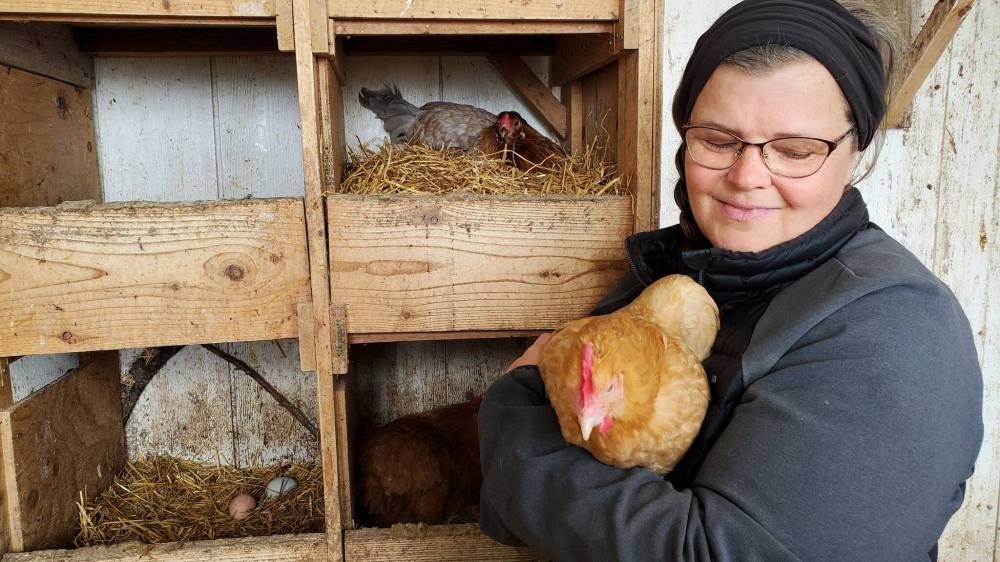Urban coop pilot project heads to council for final vote
Advertisement
Read this article for free:
or
Already have an account? Log in here »
To continue reading, please subscribe:
Monthly Digital Subscription
$0 for the first 4 weeks*
- Enjoy unlimited reading on winnipegfreepress.com
- Read the E-Edition, our digital replica newspaper
- Access News Break, our award-winning app
- Play interactive puzzles
*No charge for 4 weeks then price increases to the regular rate of $19.00 plus GST every four weeks. Offer available to new and qualified returning subscribers only. Cancel any time.
Monthly Digital Subscription
$4.75/week*
- Enjoy unlimited reading on winnipegfreepress.com
- Read the E-Edition, our digital replica newspaper
- Access News Break, our award-winning app
- Play interactive puzzles
*Billed as $19 plus GST every four weeks. Cancel any time.
To continue reading, please subscribe:
Add Free Press access to your Brandon Sun subscription for only an additional
$1 for the first 4 weeks*
*Your next subscription payment will increase by $1.00 and you will be charged $16.99 plus GST for four weeks. After four weeks, your payment will increase to $23.99 plus GST every four weeks.
Read unlimited articles for free today:
or
Already have an account? Log in here »
Hey there, time traveller!
This article was published 12/04/2022 (1340 days ago), so information in it may no longer be current.
DESPITE warnings from local and national animal advocacy groups on what may come to roost in urban coops without proper support, Winnipeg has taken a step forward in favour of backyard chickens.
City council’s protection, community services and parks committee approved a two-year, 20-site pilot project Monday, by a 3-1 vote. The issue must still pass a final council vote.
The committee also directed city staff to report back on final details of the urban chicken keeping framework, which could still alter its details.

Couns. Ross Eadie, Markus Chambers and Shawn Nason formed the majority. However, Coun. Sherri Rollins asked for her dissent to be put on record.
“Are we going to potentially create an issue for community-based organizations and veterinarians that we don’t already have?” said Rollins, adding the pilot is not ready “for a number of reasons.”
“I’m obviously also concerned by the Canadian Food Inspection Agencies alarm and vets being occupied with avian flu; I don’t want to cause them additional problems.”
While avian flu, a respiratory disease transmitted to domestic fowl primarily through wild birds, has not reached Manitoba, animal advocates say the disease is inevitable and backyard urban coops will only extend its lifetime.
“Simply put: this program makes it far too easy to view these sentient, intelligent animals as disposable and that is a direct contradiction to everything that this bylaw represents,” said Brittany Semeniuk, representing the Winnipeg SPCA at Monday’s meeting.
“The optics alone in supporting this program right now is highly discouraged from a veterinary medical standpoint.”
Many SPCAs across Canada disagree with urban farming, recommending Winnipeg reject the program. In a written testimonial, the Montreal SPCA highlighted re-homing unwanted hens and roosters is “a huge challenge.” Local sanctuaries and hobby farms are “saturated,” and the group is “uncertain” about future options.
“I’m in favour of having chickens within city limits, as long as it’s done within the context of rescue,” Debbie Wall, a resident of Wolseley who has worked in veterinary clinics for more than 30 years, told councillors. “Having said that, it would be very important that those receiving these hens have the proper resources to house and feed them in a manner that optimizes (the chickens’) mental and physical well-being.”
On the other side of the fence, Louise May said the project is “essential that we know where all of the chickens are in the city, because if an influenza hits, by making (backyard chickens) not legal, all the current owners — and there are many — have gone underground.”
The local backyard chicken advocate touted the advantages of urban coops.
“There are a lot of reasons to raise chickens that aren’t talked about, like food security,” said May, who purchases her chicks from heritage rather than commercial breeders, whose chicks act as meat and egg birds and separate their chicks by sex.
“I’ve never seen kids that don’t want to go into the chicken coop and pick the eggs. When you think about this experience being a part of your family dynamic… I would say that’s my biggest conclusion for this whole thing: do it for the kids.”
Outside of disease and ethics, the project’s opponents said healthy hens only produce eggs for up to two years, despite having a potential life span of up to 12.
“What we would be primarily concerned about is what happens to these chickens if the individual isn’t raising the chickens or the chicken isn’t laying eggs, and then after two years, they’re given away… or just killed, and that is a far bigger red flag for our organization,” said Semeniuk.
“We do not support a program that would inadvertently treat a sentient animal as a disposable product.”
fpcity@freepress.mb.ca
History
Updated on Tuesday, April 12, 2022 10:28 AM CDT: Adds that the committee also directed city staff to report back on final details of the urban chicken keeping framework



